- Home
- Robert J. Harris
Will Shakespeare and the Pirate's Fire Page 14
Will Shakespeare and the Pirate's Fire Read online
Page 14
“By the Virgin, we made it!” cried Grace.
They all let out a triumphant whoop that was cut short by the sight of what lay dead ahead. Walter and Lok made a scramble for the oars, but it was too late to turn.
Twenty yards beyond the Bridge floated a merchant galley surrounded by boatloads of English soldiers and customs officers. Some of them waved their arms and shouted futile warnings as they saw the rowing boat shoot out from under the bridge and come flying straight at them like an arrow from a bow.
Lok’s boat struck head on. The prow cracked open and the stern bounced into the air, pitching all four passengers into the river. The impact knocked Will senseless as he plunged into the water. Down and down he sank into a cold, black nothingness. As his senses returned he realised he couldn’t tell up from down and he began to panic.
He had instinctively taken a breath when he was slammed out of the boat but he hadn’t much air left. Kicking vigorously, he fought the powerful tug of the current and struck out for the surface. Stubbornly he worked his way upwards stroke by stroke.
A rough rash of barnacles grazed his knuckles. To his horror he realised the tide had swept him right under the ship. His lungs were on fire, his chest a knot of agony. Trapped inside his shirt, Dee’s book dragged on him like an anchor. Clawing at the hull, he followed the upward curve of the ship’s side. Then, just as the last of his strength was giving out, his head broke the surface.
Will’s first gulp of air was like a draught from Heaven. But before he could take another he was ploughed down by an oncoming rowboat. Water forced its way into his open mouth and down his throat. Even as he gave himself up for lost, he was lifted up on the sweep of an oar.
“Heave there, neighbour Dulworth!” came a voice.
Two pairs of hands caught hold of Will’s jerkin and legs and hauled him up. Powerless to help himself, he was dragged bruisingly over the side to topple into the boat. His chest and stomach knotted convulsively. The next moment he spewed up a bellyful of river water.
“Keep clear of that, neighbour Dulworth!” one of the men warned the other. “You don’t want none of that on you.”
When he had finished retching and had sucked in three good lungfuls of fresh air, Will finally looked up. Through blurred vision he saw two men standing over him dressed in frayed green tabards that marked them out as constables. One was a lean, scarecrow-like figure with a large, carrot-shaped nose. The other was plump with a round, owlish face. Will tried to thank them but all that came out was a wordless croak.
“What’s that he says, neighbour Bellows?” the chubby constable asked.
“Something in his own foreign tongue no doubt,” Bellows answered with a knowledgeable air. “You can see to look at him he’s no Englishman.”
“I – am – English,” Will managed to force out.
“Then double the shame upon you for being a smuggler,” Bellows scolded.
“An honest Englishman should pay the customs duty that’s owed the crown,” the round-faced Dulworth added pompously.
Will propped himself up on his elbow and gazed out over the river. There was the ship, the deck crawling with armed men, prisoners being passed down to the boats where constables waited to guard them. He saw no sign of his three companions.
“I’m no smuggler,” he protested hoarsely. “My boat was capsized by accident.”
“I’m pleased to believe you did not mean to drown,” said Bellows, “but you are a smuggler and the proof is as follows. First, that you are neither constable nor soldier. Second, that you are not a fish. In conclusion, you are a smuggler.”
“Spoken like a philosophist,” the other man complimented him. “There’s no trickery can defeat sound argument.”
Will shivered and coughed. He felt as if the cold water had seeped right into his bones and he could barely keep his eyes open.
“He’s got something hidden under his clothes, neighbour Bellows,” Dulworth pointed out.
“You have the right of it, partner,” said Bellows. “Let’s have a look there, lad. We’ll make a proper examination of the matter.”
Dulworth held Will in place while Bellows reached into his shirt and dragged the book out.
“What’s this then?” Bellows wondered, cocking an eyebrow. “Maybe it’s a volume of bawdy pictures from Italy, eh?” He winked at his friend and they both stifled their laughter.
“It’s no good to you,” said Will, making a grab for the book.
“I’ll thank you to keep to your place, my young knave,” said Bellows, lofting the book out of his reach. He opened it with a supercilious expression that reminded Will of a schoolmaster. As he turned the pages the constable’s expression quickly changed to puzzlement then to horror.
“What’s amiss, neighbour Bellows?” Dulworth asked. “You look like you’ve just caught your wife kissing the butcher’s boy.” He let out a gurgling laugh that withered away when his companion grabbed the front of his jerkin.
“You won’t be laughing when you take a look at this,” Bellows informed him curtly. He pulled the other constable’s face close to the book and flipped the pages under his nose.
Dulworth screwed up his eyes. “I can’t make anything of it, neighbour. Is it Russian?”
Bellows clapped the book shut and smacked his companion over the head with it. “No, it’s not Russian, you noddy! This is the devil’s alphabet!”
Both men turned on Will with wary suspicion in their eyes.
“It’s just a book,” Will said weakly.
“No Christian ever wrote such a book,” said Bellows, stabbing a finger at the Meta Incognita. “And the proof is this. First, it is not Scripture. Second, not being Scripture, it is not holy. In conclusion, as it is unholy, it is the devil’s work.”
“Most soundly disputed, neighbour,” said Dulworth.
Bellows brandished the book like a club. “Magic spells is what this is,” he said. “Witch’s curses to sink ships and blight cattle.”
“A neighbour of mine’s best mare was lamed by a witch,” Dulworth piped up.
Will tried to sit up but he was too weak. “Horses just go lame,” he said. “It’s nothing to do with witches.”
“And how would you know about that mare,” Bellows asked darkly, “unless you had some hand in the cursing?”
“Neighbour Bellows!” Dulworth exclaimed excitedly. “Did you note how he floated on the water like he was made of wood? That’s the sure mark of a witch or I’m a blockhead.”
“You’re right, neighbour, most egregiously right,” Bellows agreed. “It is a manifest evidence of witchcraft.”
Will’s head was so clouded he could almost suppose he was dreaming. “I was just in a boat,” he began weakly, trying to muster some defence.
Bellows clamped a sweaty hand over Will’s lips. “Neighbour, we’ll stop up his mouth before he lays a curse on us!”
They held the prisoner down and silenced him with a gag, then lashed his wrists behind his back with a strip of leather. Once he was secured, the two constables stood over him and nodded in satisfaction.
“Should we take him to the Fleet Prison with the other smugglers?” Dulworth asked.
“No, neighbour Dulworth,” Bellows answered with a solemn shake of the head. “The Fleet’s for your common, everyday rogues and cutpurses. No, this one’s for the Tower.”
26 The Protector of England
“Come on, wake up! You’ve had your sleep!” Will felt the toe of a boot thump into his ribs. He moaned groggily as his wrists were untied and the gag wrenched from his mouth. Above him a lantern burned with a sullen, red flame that cast a lurid glow over the cell, but after hours of darkness even this cheerless light was enough to make his eyes smart.
A small grille was set in the ceiling overhead, designed in such a way that it admitted air from outside but no glimmer of light. He was lying on a cold stone floor, over which a handful of dirty straw had been thrown as a meagre covering. Two men stood over him, their faces shadowy in the dim light
.
“Off with you now,” ordered the nearer of the men as he set his lantern down on a shelf in the wall. “I’ll summon you if there’s a need.”
Will saw the guard who had locked him in here depart, heard his boot heels scuffing on the steps outside. Now he was alone in the cell with a stranger who pulled the door shut and turned to face him.
Will tried to gather his scattered thoughts. He had only a vague recollection of being lifted half-conscious from the constables’ boat on to a dock. He was dragged, stumbling, across the grounds of the Tower of London, through a door and down a steep stairway. At the bottom he was flung into a windowless cell like a discarded cloak and left there, bound and gagged.
A pair of snake-like eyes peered at him out of a gaunt, parchment face. The head tilted to one side on a neck that was two inches too long and the thin lips spoke.
“Here, sit on this.” The voice was grey and sharp-edged like a broken piece of flint.
The stranger picked up a stool and set it down directly in the centre of the cell. He was dressed in plain black clothes with no lace or finery about him. His sparse yellow hair was heavily oiled and plastered to his skull, his beard no more than a fringe clinging to his chin.
He stood by patiently while Will struggled on to his knees and crawled towards the stool. As soon as he leaned on it, it toppled over and he fell flat on his face, his cheek scraping over the coarse flagstones.
The man in black made no move to help, but watched impassively as Will righted the stool and clambered stiffly on to it. He walked in a full circle round him then stopped in front of the prisoner, his arms folded behind his back.
“Tell me what your name is, my young master.”
Will’s brow furrowed. He had used so many names already – Shakespeare, Shakeshaft, Goodfellow – he hardly knew which to choose.
“Will,” he said. “That’s all.”
“True or not, it will serve,” said the gaunt man, shrugging one slender shoulder.
Will wrapped his arms about himself and tried to stop shivering. His clothes were still dank from being soaked in the Thames, his mouth was parched and rancid. “I’d be obliged if you’d give me some dry clothes to wear,” he said.
“Dry clothes?” The round head wobbled on its stalk of a neck. “No, we don’t keep any of those, young Will. No need for them.”
“Some water then.”
The gaunt man shook his head again. “None of that either.”
“But when prisoners come—” said Will, his teeth chattering.
“When prisoners come here, they are very quickly executed, young Will,” said the man in his scratchy voice. “Or sometimes they just disappear altogether, like they’d never existed at all. Marvellous, isn’t it?”
“I’m very cold, Master…”
“Sledd’s my name, Master Charles Sledd. But you can call me Charlie. Only if you’re telling the truth, mind. I hate it when people call me Charlie then lie to me.”
“I won’t lie to you, Master Sledd.”
“Charlie, boy, Charlie if you’re telling me the truth,” said Sledd. He resumed his pacing. “So tell me, what sort of a fellow are you?”
“I’m not sure what—”
“I’m asking your means of livelihood, young Will.”
Will was so tired and cold he could hardly think. “I’m a glover,” he muttered, unsure himself if that was the right answer.
“A what?”
Will suddenly realised that it would be a terrible mistake to offer any trail that might lead back to Stratford and his family. “A player,” he said more loudly. “I’m a player, you know, on the stage.”
Sledd stopped walking. “A player?” He tutted disapprovingly. “That is very unhappy news. Players are the most excellent of liars, inflaming the people with their falsehoods, steering them into the path of violence.”
“It’s just stories,” Will said, “entertainment.”
“That’s a very poor excuse for wrongdoing,” said Sledd. “But we’ll speak no more of it for the present. Now, when you were found floating unnatural in the water—”
“Unnatural?” Will looked up with a glimmer of indignation.
“That’s what I was told, young Will.” Sledd’s voice took on a menacing edge. “And I’ll be obliged to you if you don’t interrupt me again. Now, when you were found floating in the water, you had a book hidden on your person.”
“Yes, that’s right.”
“And how did it come into your possession?”
“I was delivering it to somebody.”
“Somebody? What sort of a name is that – Somebody?”
Will strained to keep his thoughts straight. Walter had made him swear to keep the Meta Incognita a secret. “I don’t know his name. I had it written down but I lost it.”
Sledd locked his fingers together under his chin and cracked his knuckles. “Well, if you’re reluctant to give me a name, I’ll have to suppose the book is your own, a book filled with unholy spells and foul enchantments.”
“No, they’re not spells, Master Sledd,” Will protested.
“Charlie!” Sledd barked, adding more softly, “if you’re telling me the truth.”
“I am,” Will took a deep breath, “Charlie.”
Sledd clenched a bony fist. “That name of mine will burn your tongue if you use it for a lie, young Will, I promise you that.”
“I think it’s a code. It’s written by a philosopher, an astrologer. That’s why it’s hard to understand.”
“A philosopher?” Sledd repeated. “An astrologer? I think what you’re trying to tell me is that he’s a warlock!”
“No, I swear—”
“Swear by what, young Will? By Satan? By Beelzebub? By Asmath and all those other demons you worship?”
“I don’t worship any demons!”
“No?” Sledd clamped a claw-like hand on Will’s shoulder. “So you’re a godly boy then, are you?”
“As godly as any, I hope,” said Will, shrinking away.
“The let’s pray together,” Sledd suggested, releasing his grip. “If you’re godly and no witch, you won’t choke on an honest prayer, will you?”
Will shook his head. The blood was pounding in his temples and he couldn’t stop shuddering.
“That’s a good boy,” said Sledd soothingly. “Now clasp you hands and bow your head. We’ll say a prayer together.”
Will locked his fingers and lowered his eyes.
Sledd cleared his throat noisily, then intoned, “Ave Maria, gratia plena…”
The prayer was one Will had learned in his childhood. As Sledd’s voice tailed off he completed it without even thinking. “Dominus est tecum…” Hail Mary, full of grace, the Lord is with thee…
Sledd grabbed him by the jaw and forced his head back. Will’s eyes snapped open in terror. “Now it’s a shame,” Sledd declared with a leer, “that a godly boy should come out with a Roman prayer, in Latin and all. It wouldn’t trip so easy off the tongue of an honest Englishman.”
Will struggled to say something, but he could think of no excuse, no trick. Sledd shoved him clear off the chair and sent him sprawling painfully over the hard, dirty floor. The interrogator’s serpent eyes, cold as bullets, fastened on to Will.
“My master, Sir Francis Walsingham, is the Secretary of State,” he said. “He has authorised me to do all I deem necessary for the protection of the Queen, this country and the Protestant faith. And here I find you, your heart corrupted by idolatry, leagued with Roman priests and witches to strike down our Good Queen Bess that’s been lawfully anointed by God Himself.”
Will pushed himself up against the wall and pressed a fist to his mouth to keep silent. Every time he spoke, Sledd found a way to use his words against him. The truth was whatever Sledd wanted it to be and nothing Will said could deflect him.
Sledd stalked him like a predator, looming over him with a contemptuous sneer.
“Give me names, boy,” he commanded sternly, “the names
of your associates, and maybe God’s vengeance will come down more heavily on them than on you.”
“I don’t know any names,” Will sobbed.
“You do,” said Sledd, regarding him with pitiless, unblinking eyes, “and by the time I’m done with you you’ll beg me to listen to them.”
He turned and plucked the lantern from its alcove. “I’ll leave you now, young Will, in a darkness of your own making. When I come back I’ll have my instruments with me. And what a lively tune I’ll play on you then!”
The door clanged shut behind him like the first horrid peal of a funeral bell.
27 Darkness and Light
Will was plunged into a darkness so absolute it snuffed out even the memory of light. His relief at Sledd’s departure was quickly eclipsed by a desolate sense of loneliness. He couldn’t see his hand in front of his face and had only his aches and bruises to remind him that his body was here at all.
His own breathing sounded strange to his ears, like the sighing of a mournful wind. The only other noises were the marching feet of the guards, the hollow bang of a door or the cries of other souls imprisoned in this fortress.
For the second time that day he was a prisoner, but on this occasion his situation was infinitely worse. He had no tricks left, no clever ploys. He felt helpless, stupid, worthless.
He crossed his arms over his knees, buried his face in them, and wept.
Should he tell Sledd the truth about Henry Beeston and his players, who were already accused of corruption and sedition? About John Dee, who was rumoured to be a sorcerer? About Grace O’Malley, a wanted pirate? Or about Walter Raleigh, who was involved in a secret plot with the vile Edward de Vere? To speak of them would only make him more guilty, and even worse, it would bring them to Sledd’s malevolent attention, dooming them as Will knew himself to be doomed.
None of them knew he was here, and if they did what would they do? Walter and Grace were only concerned with their own schemes and ambitions and now that Will no longer had the Meta Incognita, why should they care what happened to him?
That left only God, and with all the trouble that had befallen his father and losing Ann this past winter, Will was sure He had lost any interest in helping the Shakespeares. What did it matter if you prayed before a statue or a bare altar, in English or in Latin, if God didn’t listen anyway?

 Artie Conan Doyle and the Gravediggers' Club
Artie Conan Doyle and the Gravediggers' Club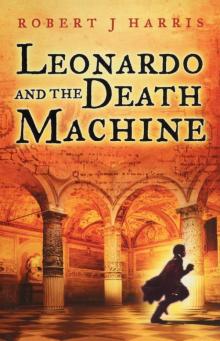 Leonardo and the Death Machine
Leonardo and the Death Machine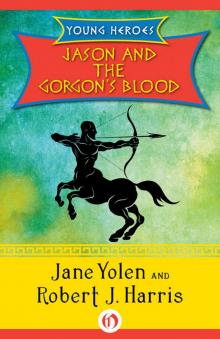 Jason and the Gorgon's Blood
Jason and the Gorgon's Blood Will Shakespeare and the Pirate's Fire
Will Shakespeare and the Pirate's Fire Odysseus in the Serpent Maze
Odysseus in the Serpent Maze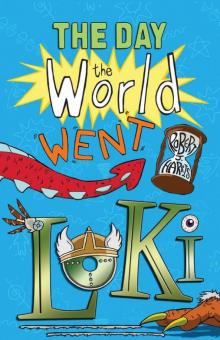 The Day the World Went Loki
The Day the World Went Loki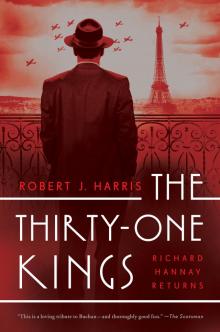 The Thirty-One Kings
The Thirty-One Kings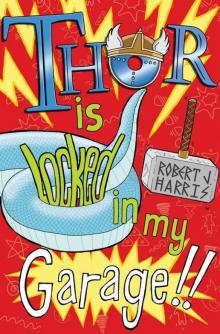 Thor Is Locked in My Garage!
Thor Is Locked in My Garage! Odin Blew Up My TV!
Odin Blew Up My TV!